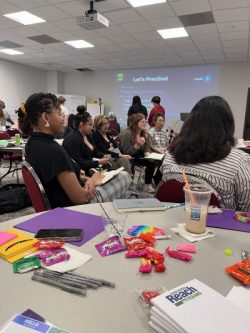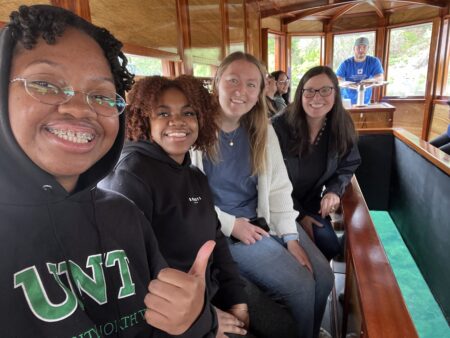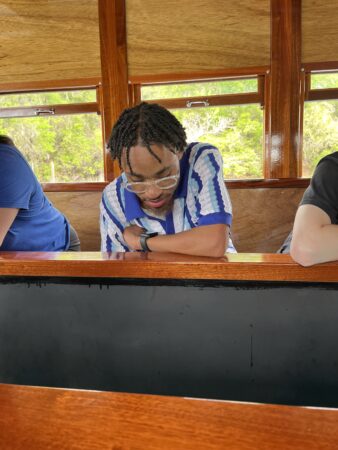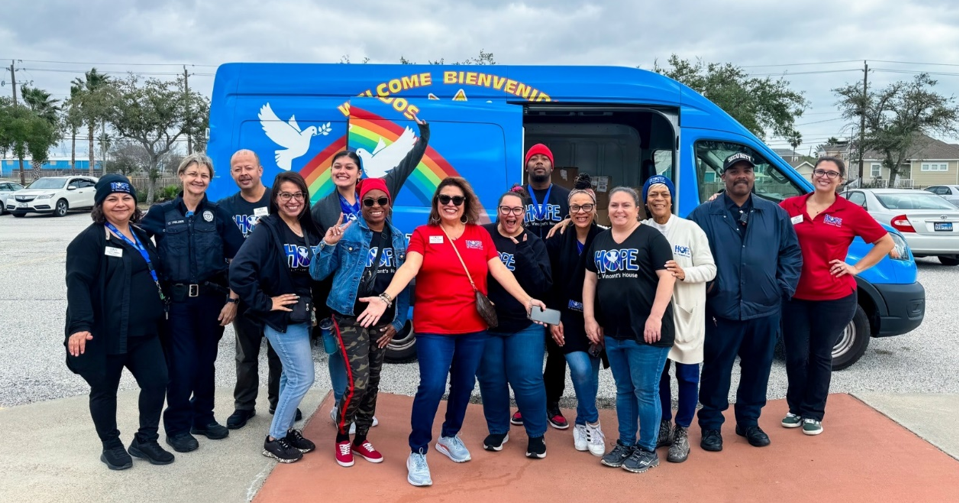
Moody Grant Recipient: PUSH Program at the University of North Texas
- How did the PUSH program at UNT come to be, and what are its objectives?
The UNT PUSH program seeks to identify, recruit, engage, support, retain, and graduate students who are among our most vulnerable on campus. Students with experience in foster care often lack the reliable resources and support needed to be successful in the university environment. UNT began its support of students with experience in foster care (SEFC) through the creation of the Persevere UNTil Success Happens (PUSH) student organization in the spring of 2012, under the leadership of Clinical Professor of Social Work, Brenda Sweeten.
Shortly after arriving at UNT, Professor Sweeten learned of a student who made a 1400 on her SAT and enrolled at UNT after aging out of foster care. This bright young woman was clearly capable of successfully managing the academic rigor required in higher education but struggled with the financial, emotional and social aspects of college life with no support system on or off campus. Sadly, she stopped out of school.
After connecting with a couple of other students with lived experience in foster care, and hearing the challenges they also faced on their journey to attaining a college degree, Professor Sweeten reached out to the Dean of Students to develop a program focused on supporting students with backgrounds in foster care.
Together with the students, PUSH was created with the goal of identifying and offering support to students with foster care experience. As PUSH became well known within the Dallas-Fort Worth region through its grassroots education and advocacy efforts, its scope expanded, as has the overwhelming support it received from child welfare professionals, the university, and greater community. After becoming overwhelmed with the growing number of SEFC attending UNT due to the unique supportive environment they found there, Professor Sweeten approached the Division of Student Affairs to seek additional programmatic support and the PUSH campus-based support program was created.
- What services does the program offer to students?
The PUSH program provides coordinated support by identifying and utilizing resources available on campus, in the community, and through the Texas Department of Family and Protective Services. Community partnerships serve as a pathway for regional and statewide recruitment of SEFC from local school districts and in the child welfare system and help provide for the needs of students through grants, financial gifts, and in-kind donations. Retention efforts include ongoing engagement activities, resource brokerage and coordination, and assisting students in meeting their educational and career goals.
PUSH offers special programming such as a summer bridge program for first-time-in-college and first-time-at-UNT transfer students. Throughout the year, specialized programming provides life skills training and dedicated advocacy services to students, as well as additional resources such as textbook vouchers and academic supplies, emergency funds for housing, food insecurity, care packages with snacks and hygiene products, and provisions to meet other basic needs as they arise. Through the generosity of donors, students also have access to medical, dental and mental health services.

- Why is it important to provide services and support to students who have experienced foster care?
Students with experience in foster care have unique needs and challenges. Many have encountered a childhood that involves a traumatic experience coupled with temporary or permanent separation from parents, caregivers and oftentimes siblings. During their foster care experience, they frequently suffer a loss of autonomy in decision making and fundamental opportunities to participate in normalizing activities that allow the knowledge and skill acquisition needed to transition to adulthood. Most foster youth say they aspire to attend college; however, the likelihood of them ever enrolling is far less than their peers who have not experienced foster care and many foster youth do not see themselves as “college material”. Of those foster youth who do enroll, only 4-10% will earn a college degree within 6 years, a sobering statistic compared to the nearly 30% of their non-foster care peers.
In Texas, former foster youth may qualify for a tuition and fee waiver which covers the costs of tuition and fees at all public higher education institutions across the state – and those who use the tuition waiver are 3.5 times more likely to graduate with a 4-year degree. However, only about 60% of students who are eligible for the waiver are utilizing it, which means over a quarter of our SEFC are paying for higher education that they can get for free. The partnership between UNT, our six other pilot sites for the grant, and The Moody Foundation allows us to close service gaps so SEFC can access benefits and resources for which they qualify and to ensure the likelihood of their success.
Assisting this vulnerable student group is essential to their success by connecting them with the unique benefits for which they qualify including stable housing, medical and mental health care, as well as academic and career services. Campus-based support programs and dedicated higher education foster care liaisons, which are mandated by the state without funding support, are a key element in ensuring the success of this student population.
- Share some recent accomplishments from the PUSH program at UNT.
The UNT PUSH program supported 26 SEFC who graduated in 2024! We are also excited to serve as one of the pilot sites for the Moody Foundation M-Pact grant. We recently hired two peer coaches with lived experience in foster care. Both coaches are currently in training using the Fostering Success Coaching Institute model adapted for use by students to support their peers. The PUSH program is also adding a Master of Social Work student intern this fall to increase engagement efforts and develop additional programming opportunities. We are exploring the possibility of adding a new wrinkle to our program that would allow us to better utilize campus and community-based mentors to help support more students. To add a humble brag, one of our founding PUSH students, Mr. Jackie Davis, was awarded a UNT Alumni Association Rising Star Award for the incredible work he is doing in the child advocacy realm with Dallas CASA.

- Tell us more about your relationship with the Moody Foundation.
Moody has generously supported the work of UNT programs since the mid-1970s. The PUSH program, which is our most ambitious partnership to date, is one of seven pilot sites for the Moody M-Pact program. In partnership with the UNT Foundation, The Moody Foundation funded a project to increase tuition waiver usage for those SEFC eligible for the waiver, increase retention rates, and increase attendance in campus support programs at each of the pilot sites. Brenda Sweeten and Dr. Sheila Bustillos (M-Pact project manager) have both a deep respect and appreciation for The Moody M-Pact Fund team.
The Moody Foundation has given our project both high expectations and high support with their collaborative approach to these funds. The M-Pact summit was packed full of helpful tools and information that we immediately applied to our work. We look forward to continuing an impactful and positive relationship with the team.
- Upcoming events or key milestones we should highlight?
Along with the other 6 pilot sites for the M-Pact Fund, we trained 7 peer coaches across the state and are hiring 7 more in the next 2 weeks for another summer training. Peer coaches will spend the summer planning and organizing efforts for the 2025-2026 academic year. They will also receive continued professional development training this summer including more peer coach practice and holistic coach training (self-care practices) so they can support their peers with any challenge.
Read more here: Studentaffairs.unt.edu/push




